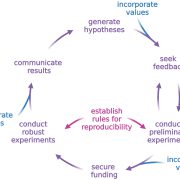Taking Control of Your Own Mentoring
Yesterday I attended a “Careers in Industry” discussion where it was noted that people working in industry often benefit from more structured mentoring programs than are the norm in academia. The lack of formal mentoring programs and mentor training has long been noted as a weakness in the academic training system. One of the panelists recommended that everyone learn to “take control of your own mentoring”.
Here is an excellent chapter on Mentoring and Being Mentored from HHMI’s “Making the Right Move” guide. I’ve excerpted here the sections on How to Get the Mentoring You Need and How to be Mentored Well – the advice they give is excellent.
HOW TO GET THE MENTORING YOU NEED
Being mentored is as much an art as mentoring. It’s a matter of getting plugged in to a complex network, knowing whom to ask for what, knowing how to accept the professional advice you receive, and maintaining long-term personal and professional relationships. The following suggestions may help:
* Don’t let go of your old mentors. Stay in close touch with your graduate and postdoc advisers. Although they may not be familiar with your new environment, their distance from it, combined with their general understanding of the world of science, can help you put your current environment in perspective. Also, you never know when you will need to ask them for a reference or other professional help. Even a quick e-mail to let them know that you published a paper or received a research grant or an award will help them support your career.
* Establish a relationship with a set of official mentors. Your new department probably will assign you a mentor or even a mentoring committee. These individuals may ultimately constitute your promotion and tenure committee, so cultivate them carefully and treat them with respect. You do not want to vent your frustrations or confide your uncertainties and weaknesses to this group.
* Seek out informal mentors. These usually are experienced scientists within your department or elsewhere who can give you a broader perspective on science and scientific politics. It is especially important to do this if your department has not assigned you an official mentor.
* Establish a set of confidants. These are people with whom you can openly share information about politically sensitive issues. Choose them carefully. You may be more comfortable limiting your confidants to one-on-one relationships. Or you may find a group that puts you in close touch with colleagues whose situations are similar to yours.
* Meet regularly with your formal mentors. Keep them apprised of your progress. Do not avoid them if things are going badly. Enlist their help.
* Keep meetings professional. Respect your mentors’ time constraints. Be prepared and specific about what you ask for.
How to Be Mentored Well
Here are some qualities to cultivate in yourself as you seek to be mentored:
* Foresight: Start early to think about your future.
* Proactivity: Don’t expect to be taken care of. You could easily be overlooked in the competitive world of science.
* Probing: Ask tough questions. Find out about the experiences of others with this potential mentor.
* Respect: Be polite. Make and keep appointments. Stay focused. Don’t overstay your welcome.
* Gratitude: Everyone likes to be thanked.
* Reciprocation: Repay your mentor indirectly by helping others.
* Humility: Be willing to accept critical feedback so that you are open to learning new ways of thinking about and doing science.
I also recommend that you develop a Mentoring Network – this blog post “Taking Ownership of Your Own Mentoring” describes this in more detail and provides a handy chart to fill in to help you identify people who can mentor different aspects of your life and career.

Finally, I wanted to share one of my favorite career-planning graphics, The Ikigai Venn Diagram. We should all strive to find the job that: we love, pays us, we’re good at, and the world needs.

What are your experiences with your academic and career mentoring so far? Does your university support you and provide training to your mentors? Do you have access to training in how to get the mentoring you need? Can you share examples of how your university, advisor or program supports you? If you don’t feel your program or university supports you, how would you change the system to improve it?










Leave a Reply
Want to join the discussion?Feel free to contribute!